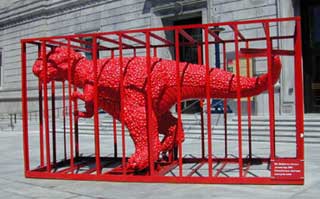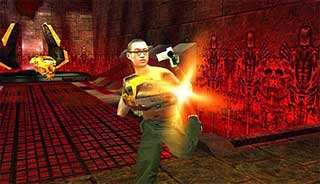The China Connection, part 1.
This panel discusses the role that European media arts and technology organisations have been playing in the recent developments of a Chinese media-cultural agenda. It asks how Chinas new electronic media artists deal with the social potentials of globally connected media technologies - from CCTV through cryptography to open source software, with all their attached cultural dimensions.
Here's a few notes on what was being said during the panel (which included only one Chinese and three Dutch speakers!)
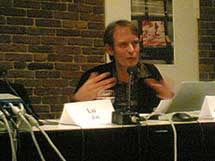
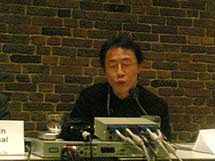
Alex Adriaansens, director V_2, Rotterdam.
As a foreigner, Adriaansens found China very hard to understand, it's very big, there are many cultures, many languages but at the same time, the country is very coherent and is strongly controlled by the governement. People expect China to take a leading edge on technology and economy. So far the US is the strongest in terms of economy and technology and when it imports some of it to us, Americans embed deep cultural elements in them. The same thing will happen when the technology we'll use will come from the East.
Lu Jie: artist and media activist, 25000 Cultural Transmission Centre, Beijing.
The internet power is amazing. Whatever the attempts of the Chinese government, the power of internet is beyond its control or censure. The benefit are immense, especially for grassroot people, think about the agricultural society, people living in remote areas, etc. Example: The Super Girls contest (similar to American Idol), during the 2500 edition 400 million people watched the TV programme continuously during months. They didn't care about war, Tsunami or anything else. On the final night of the competition, 8 million people voted with their mobile phones. It was the most democratic vote in the history of the country. There are clubs, fans and fundations to back the candidates. Some say this new way to bring people together is a revolution.
Today's highly successful new media artists in China are criticised by the young generation. They say that these artists are just producing works to please the curators of art biennales not to investigate or reflect on society. They know what art curators like and make work especially for them. On the other hands, the students of art school admit that they are not being educated to reflect on society only learn the techniques. There's so much money to make in art in China these days that parents are no longer pushing their children to study engineering or law but also art.
Discussion:
The Super Girl contest can also be regarded as a perversion of democracy, as a way to distract people from crucial issues. Or one could stress that it's the first sign of some kind of democracy.
30 000 persons are employed by the government to read blogs to denounce the "bad" ones or counter act (writing long comments explaining how good the government is acting).
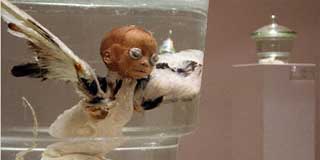
Xiao Yu's Ruan
Jie: the media is totally beyond control in China. Think about that artist who cut into pieces and ate an aborted baby. The artist is still walking free in the streets. China's situation is very complex.
On March 30, at 19.00 Tangent:Leap, a meeting at V2_ in Rotterdam about the emergent blogosphere in China. The event will be streamed live.
Originally posted on we make money not art by Rhizome
